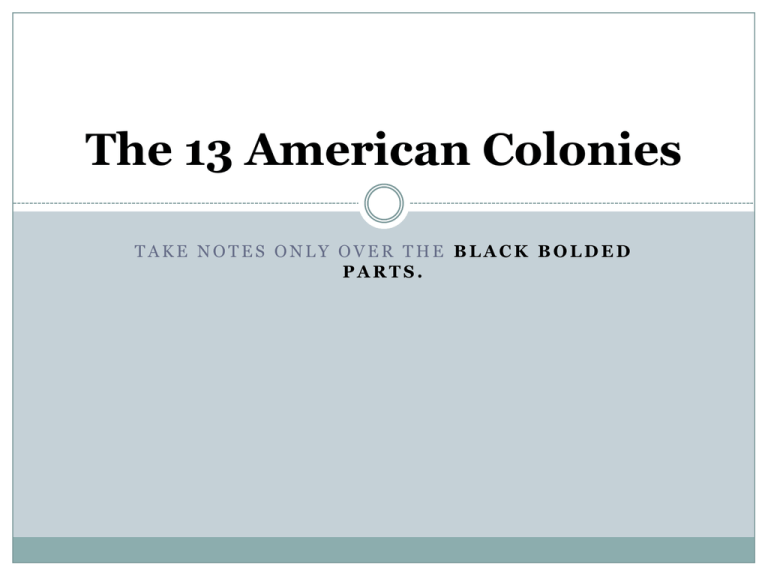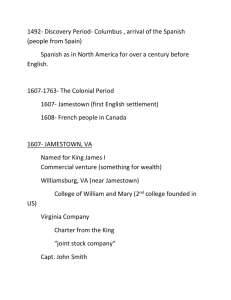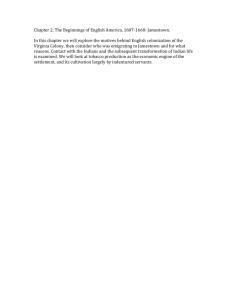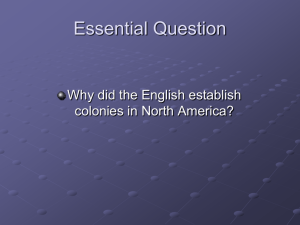13 Colonies PP
advertisement

The 13 American Colonies TAKE NOTES ONLY OVER THE BLACK BOLDED PARTS. Roanoke 1580s – The Lost Colony Poorly planned and supplied Failed due to hunger and bad relations with the Native Americans. John White returned in August 1590 to find no colonists on Roanoke Island. On one of the trees was written CROATOAN. Jamestown1607 Jamestown (1607) 1st SUCCESSFUL English Colony in America. Joint Stock Company- a company backed by investors. Each investor receives a piece of the company called a share. Virginia Company of London Hardships in Jamestown Swampy Location Malaria Lack of clean water Misguided work ethic Climate Native American conflict The Starving Time (1609-1610) Success in Jamestown John Smith-1st successful leader Success under Smith: Instilled a strong work ethic “He who will not work, shall not eat.” –John Smith Built a wall around Jamestown Worked w/ the Powhatan Tribe Success continues… John Rolfe – arrives in Jamestown in 1610 Brought Tobacco to America Slave labor was introduced Indentured servants- A person under contract to work for another person for a definite period of time (5-7 years), usually without pay but in exchange for free passage to a new country. Became the main cash crop- a crop grown and sold for profit Free Enterprise Business not interfered with by government Colonists farmed the land for profit Private land ownership expanded VA House of Burgesses Start of Representative Government 1619 – Virginia Company allows creation of a representative body. The House of Burgesses was the 1st legislature in the colonies. Gave people a voice in their government Ten towns sent 2 representatives called burgesses to an assembly July 30 – House of Burgesses met at a church in Jamestown A Review of Jamestown (Virginia) 1607 Created by Virginia Company of London Joint Stock Company created colony to make profit for investors Many hardships faced John Smith helped make the colony successful John Rolfe’s tobacco plant created wealth Created House of Burgesses in 1619 First representative body (legislature) in American colonies The New England Colonies Plymouth Colony of Massachusetts 1620 Pilgrims-a religious group who separated from the Church of England Mayflower Compact (1620)- established the idea of self-government and majority rule in the colonies. The 1st Thanksgiving Samoset & Squanto- NA who spoke English Negotiated a peace treaty with the Pawtuxet tribe Showed the Pilgrims successful farming methods Created a trade alliance Massachusetts Bay Colony Puritans- a religious group who left England to escape persecution by King James. Great Migration20,000 Puritans left England to settle in New England John Winthrop- 1st Governor/Preacher of Massachusetts Bay Colony “New England Way” of Lifeduty, godliness, hard work, & honesty. John Winthrop Rhode Island Colony 1636 Roger Williams kicked out of Massachusetts Believed in the separation of church and state Thought the Native Americans should be treated fairly Roger Williams New Hampshire 1623 John Mason wanted to start a colony for fishing and trade Portsmouth Expanded by John Wheelwright in 1638 Some Puritans seek more freedoms Atlantic Cod Connecticut Colony 1636 Established by Thomas Hooker Dissatisfied with lack of freedoms in Mass. Fundamental Orders of Connecticut: The 1st Constitution in the colonies Extended voting rights to non-church members Limited the power of the government Expanded representative government Thomas Hooker The Middle Colonies New York Originally New Netherlands founded by the Dutch 1624 ◦ Taken for its trade routes & commerce Became English in 1664 Given to the James, Duke of York (later James II) New Jersey Originally part of New Netherlands Became English in 1664 Land sales and religious freedom Given by James, Duke of York to friends Berkeley and Carteret Pennsylvania 1681 William Penn-founder of Pennsylvania Land given to William Penn to as repayment for a loan Established for the Quaker religion Penn insisted on also paying the Native Americans for their land William Penn Delaware 1638 Originally settled by the Swedes (Sweden) 16431655 Taken over by the Dutch 1655-1664 Taken over by the English when they took New Netherlands Maryland and Pennsylvania both claimed until 1704 The Southern Colonies Maryland 1632 Founded as a refuge for English Catholics Welcomed all Christians Toleration Act 1649- required religious tolerance in Maryland; basis for the 1st Amendment Lord Baltimore The Carolinas 1663 Founded in 1663 Split into North and South in 1712 Georgia 1732 Place to send debtors Keep the Spanish and Seminoles from attacking from the south Strict rules; no slaves, no alcohol James Oglethorpe





